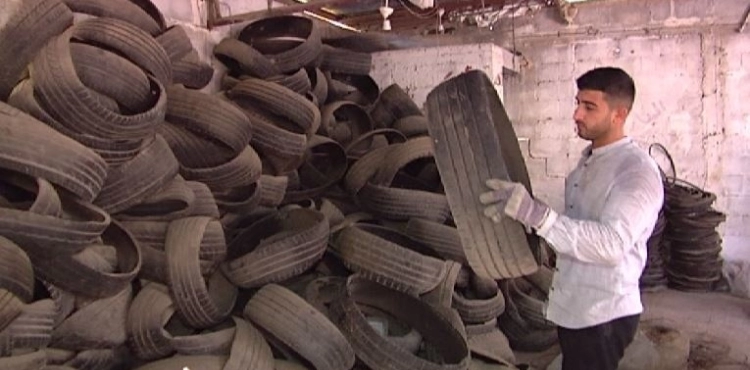In his small workshop near the separation fence, east of Gaza City, Palestinian Madian Helles spends many hours a day recycling dozens of damaged vehicle tires and turning them into environmentally friendly tools.
Hellas, 27, succeeded in recycling thousands of damaged tires into crushed rubber that is used in small, industrially turfed stadiums, investing in tire residues in organic farming, and producing wires that are used in the manufacture of electrical tools.
Hellas says, while wearing gloves in his hands and holding a damaged tire before grinding it inside a special machine, that he came up with the idea two years ago when he saw some young men burning vehicle tires at the fence separating Israel during previous protests.
Helles, who seemed convinced of his work to preserve the environment and reduce the amount of waste, told Xinhua, "I was shocked by the large number of tires that were being burned during the protests (..) and I asked myself where the youth come from." So many damaged tyres.
Moreover, the young man explains that "burning vehicle tires means that our air will be polluted, which will negatively affect our health."
As a result, the young man, who graduated in geology from a university in Gaza in 2016, decided to search more about the amount of damaged car tires and whether the way to dispose of them was safe.
After a few months of in-depth research, Helles found that only 10 percent of the damaged tires can be recycled into park benches and some children's toys, and 90 percent is usually burned or buried, which negatively affects the environment.
In fact, according to Helles, the burning of damaged tires results in black clouds and toxic smoke, while burying them in the soil does not prevent harmful emissions from them, which would cause a catastrophe affecting the entire population and the spread of deadly cancerous diseases.
In an effort to get rid of damaged vehicle tires without harming the environment, the young man decided to take the initiative himself and recycle them into useful tools. However, his task was not easy because he did not have any machines that would help him recycle the layers, nor money.
“At that time, I felt that my dream of achieving my goal of enjoying a healthy environment had vanished,” Helles recalls.
However, he sticks to his goal and decides to manufacture a grinding machine in a local factory first and then start his own business, not only to protect his environment but also to earn some money that would help him overcome unemployment and sustain his family of nine.
Hellas hopes that his idea will turn from a simple project into a major project that will deal with all damaged car tires, not only in the coastal strip, but also in all Palestinian territories, in order to reduce the effects of pollution.
The young man in his twenties also aspires for his idea to be the nucleus of a major national project based on spreading the idea of "zero waste" by recycling all waste in the besieged Strip.
Helles' actions have been praised by environmental experts in the coastal enclave, which is home to more than two million people.
"The tire recycling project for damaged cars is the first of its kind in the Palestinian territories, and it aims to benefit from waste in an environmentally sound way," environmental expert Abdel Fattah Abed Rabbo told Xinhua.
Abed Rabbo believes that youth initiatives have become an urgent necessity in the sector, which is witnessing a fragile and weak environment and a large human overcrowding compared to the area, including initiatives that contribute to reducing environmental pollution.
He adds that the sector is witnessing great pressure in vehicles, and therefore there are large quantities of damaged tires, and recycling them for the benefit of the environment and society is considered a beautiful and civilized thing and reduces the volume of waste and reduces the risk of burning it.
Abed Rabbo called on young entrepreneurs to intensify their initiatives that work to get rid of waste and preserve the environment in the Strip, which is inhabited by about 2.3 million people.












